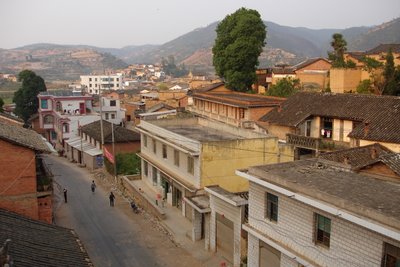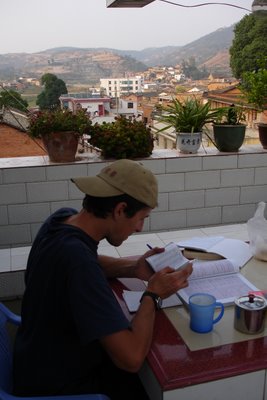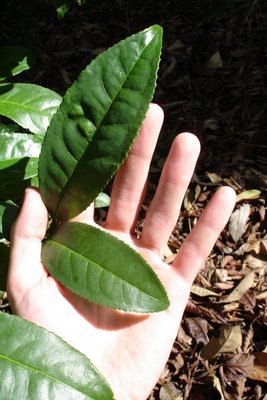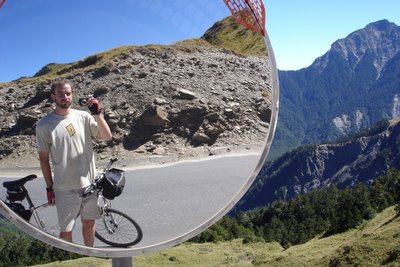July 15th, 2006. and one more
This video features less white noise and more rooster calls, bus honks, SaBaDis, kids rolling tires, bathing, and some screams of introduction.
Wish I had a wide angle lens for this...
July 5th, 2006. TIBETAN HERDERS STOLE MY BICYCLE
To properly tell this story I need to start a day earlier. I had just ridden over the fourth consecutive pass of the day when the thunder storm that had been chasing me for the past hour caught me. I was tired. It started pouring as I put on my soft shell, covered my rear panniers with my rain coat, and opened my umbrella to protect my front bags. I continued slowly downhill in this awkward fashion, noting that lightning was striking the ground nearby, and I was on the biggest chunk of metal for miles. Then I saw a little shack right off the road, with a little curl of smoke promising a warm and dry break. A 10 year old boy beckoned for me to come in, and I happily did so.
Inside it was clear that the ten year old was in charge, as there were only a seven year old and a three year old besides. I sat down and asked where MaMa and BaBa were, to which they just gestured out into the wet hills. The boy stoked the fire and put on some tea.
When the rain slowed up, we all went outside to check out my bike. They were particularly interested in my blue umbrella, which I quickly learned the Tibetan name for as they discussed its merits. Nyigdugs.
Then came a whispering session in which my nyigdugs was often mentioned. Soon after the oldest boy told me that he had to go fetch water, and could he borrow my nyigdugs? Well, it was still raining a little, and I'm no man to let a little guy get more wet than needed, so I lent it to him. I went inside and sipped my warm tea. He sauntered in a few minutes later. He looks at me. I look at him. He casually stokes the fire. And the umbrella? Following this question came an elaborate pantomime, the meaning of which seemed to be that a gail force wind had ripped the umbrella out of his hands and blown the umbrella into oblivion. I pointed out that there wasn't a breath of wind, but this only lead to a repeat of the prior performance. I implored him to go get my umbrella. I begged. Eventually he started ignoring me.
I have often found myself in situations similar to this while teaching english. My angry face is apparently not very convincing. I appealed to sympathy, pointing out that I had no home and that if it rained, I would get very cold and wet. Nothing. A motorcycle with two grown men stopped soon after. Now I've won, I thought. I explained the situation to them. They spoke with the kid, and he gave them the same explanation. I told them that he was a liar, and please get me my umbrella back. They looked at me. I looked at them. They drove off without a word.
I searched in some of the obvious places for a minute or two, and then left the little bastards in their hut.
So it goes.
I rode on for another ten km, and knowing that the next town was over 70 km down the road, started looking for a place to camp. I passed by a small group of herders on the side of the road. In all there were about eight black yak hair tents. I noticed that these folks, like the past few groups, did not seem very friendly.
I rode on another 2 km and found the perfect campsite. It was perfect because it was a depression, well off the road, hidden from all view. I set up my tent in the last minutes of light and went to bed soon after.
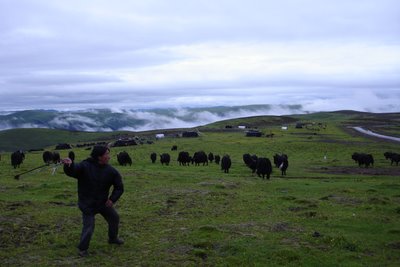 I woke up to a "woah" (it's like "hey" I think). "Woah" I replied. The zipper zipped. This is not unusual. Most people here have no concept of privacy (this reminds me of my third night in China when I found that hotel managers literally hold all the keys, and will open your door without knocking to deliver hot water while you are watching T.V. in your underwear). Anyway, I was not alarmed, and I opened the inner door though I had not been awake half a minute. The man outside my tent looked at me and my tent and gestured that I should come with him and have some food.
I woke up to a "woah" (it's like "hey" I think). "Woah" I replied. The zipper zipped. This is not unusual. Most people here have no concept of privacy (this reminds me of my third night in China when I found that hotel managers literally hold all the keys, and will open your door without knocking to deliver hot water while you are watching T.V. in your underwear). Anyway, I was not alarmed, and I opened the inner door though I had not been awake half a minute. The man outside my tent looked at me and my tent and gestured that I should come with him and have some food.
This is also not unusual. Almost every herder I pass invites me into have a tea or some food. Thoughts of butter tea and tsampa filled my head. I was still dazed from sleep, but I agreed to go with him. I dressed and grabbed the bag that I keep all my most valuable possessions in (my money, camera, mp3 player etc... I just may be a "flashpacker").
Above is a picture I took of my new friend, whipping rocks at straggling yaks we managed to herd back to the camp.
We went in his tent and he quickly poured me some butter tea and prepared the tsampa. To make a good bowl of tsampa, follow these instructions.
1.) Fill a bowl about two-thirds with barley flour.
2.) Add a good sized chuck of yak butter.
3.) Cover the flour with butter tea.
4.) Add sugar to taste.
5.) Mix with your hands, forming golf ball sized chunks to pop into your mouth.
After the third bowl of butter tea, and a bowl of curd to follow the tsampa, a friend arrived. He could speak much better Chinese than my first friend, and so we got into an in depth discussion about the finer things in life. Herding and biking.
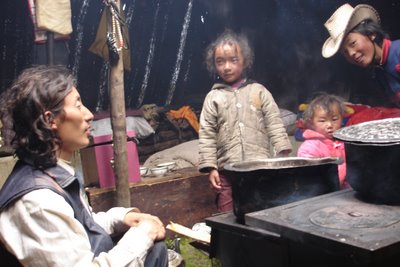 Friend #2 invited me back to his tent. Inside, I met a young boy. He reminded me of someone... My nyigdugs! It was the ringleader from yesterday.
Friend #2 invited me back to his tent. Inside, I met a young boy. He reminded me of someone... My nyigdugs! It was the ringleader from yesterday.
"Who is he?" I asked friend #2.
"My son."
Oh shit.
"I've met you before," I said to the kid.
He grinned.
That's friend #2 on the left.
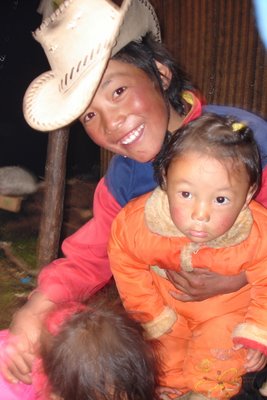 And his son in a cowboy hat. Who would suspect him?
And his son in a cowboy hat. Who would suspect him?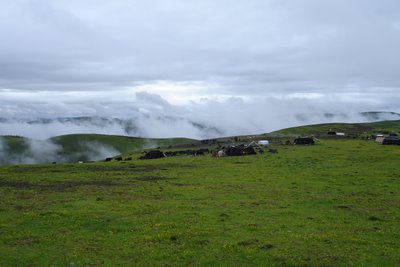 Half an hour later I was heading back to my tent. I took some fine pictures of their camp through the fog. I struggled for a few minutes to find my campsite, but I soon found it. Everything looked cool on the home front until I went around behind my tent.
Half an hour later I was heading back to my tent. I took some fine pictures of their camp through the fog. I struggled for a few minutes to find my campsite, but I soon found it. Everything looked cool on the home front until I went around behind my tent.
My bicycle was gone.
The loudest expletives that this part of the Tibetan Plateau has ever witnessed followed over the next few minutes. I found that my panniers were also gone. More expletives followed as I remembered that my portable hard drive, which holds every picture I have taken over the past four months, was in one of my panniers.
I should say that I locked my bicycle to my tent through a nylon loop.
The lock was smashed.
At least, I thought, he hadn't ripped my tent.
Eventually I lay down on the wet grass and yak shit to think about what I should do. At this point I own a tent, a sleeping mat, a sleeping bag, my leatherman, and a piece of bread. They also left me my three books, which was nice. Of course I still had my money which, along with the fact that I know hitch hiking is dead easy here, were my only consolations.
What to do?
I remembered that while I chatted with friend #2, friend #1 slipped out. I assumed he went to tend to the yaks. About 20 minutes later I went outside to take more pictures of yaks, and I saw friend #1 return on a motorcycle. I had my culprit. No one could have just stumbled across my campsite.
I summed up my assets: I had pictures of my two friends. I had three really heavy books. I had an awful lot of money. I had my leatherman?
Unsure that the police would be of any help - and beside they were at least five hours away - I decided to employ a diplomatic measure common in this day and age.
I'm speaking about bribery of course.
Don't get me wrong. I was scared. I decided that I should stay on the road away from the camp, and that I should not get really angry or make accusations. These guys carry twelve inch blades on their hips you realize.
This plan quickly fell through once I got close to the camp. I found friend #2 talking to a new man on the side of the road and immediately launched into some of the most fluent and emotionally charged Chinese I've ever used. It went something like:
"We've got a big problem. All my things are gone! My bicycle is stolen! I know you know who did it! I know who did it! Where's your friend? Tell him that if he returns my things, I will give him 500 yuan. My things are very important! You have one hour. I will wait on the road. If you don't return my things, I will call the police. Many many police will come. Many many! One hour!"
I didn't give him a chance to respond. They looked quite stunned. I turned around and dragged my things to a spot with a good view of the camp a couple hundred meters away. I sat down and opened Thoreau... I believe he was writing about the virtues of the savage.
I was quite confident at first. I set my alarm for one hour. This confidence faded after half an hour.
I should say that 500 yuan is a ridiculous sum of money in Chinese terms. I would guess that it is nearly a months salary for a peasant. It is about 60 American dollars.
Two motorcycles came roaring out of the camp. I thought they were doing a runner, but they turned in my direction. They pulled up and gestured for me to jump on.
Not on your life.
They insisted. Friend #2 said they would get my stuff, and that I should jump on. I told them that I was scared of them. I would walk. They took off up the road and I slowly followed. I walked about 2 km up the road, and finally saw one bike cruising across the plain towards the road. Friend #2 pulled up with all of my bags strapped on the back of his motorbike. My bicycle remained missing. He took off again and I continued up the road, looking a little strange I'm sure, barely managing to carry all of my bags. I really felt like I was in a bad movie.
I crested a hill and sat down to wait. A car load of Chinese tourists stopped to take some pictures of the view, and a passing monk strolled by and stopped to stare at me. The movie got worse. Everyone watched quietly. What the hell was this hapless foreigner up to?
I saw Friend #1 riding my bicycle across the plain towards us. "Oh shit," I thought, "these tourists are going to blow the trade". Friend #1 saw the crowd and veered off. There being a lot of witnesses, I got up and started after him. "Is it fun!?" I yelled. Seeing the situation, he thought better and turned back towards us.
Soon after I had my bicycle.
Everyone continued to stare. With the 500 yuan I had prepared still in my pocket, I started putting my panniers on my bicycle. My sweet sweet bicycle.
More staring. I finished. I looked around. The friends rode off, and a minute later so did the car load of tourists. Only the monk remained. We smiled at each other.
I decided that if I took off, they might get angry and follow me. I rode back towards the camp. They were waiting on the side of the road. I was being very cool about the whole thing since the yelling. We were almost like friends again. We all stood quietly.
"Do you still need money?"
"Only a little" replied friend #2.
I think they were relieved that I hadn't ratted on them. I gave them 50 yuan and went on my way.
I couldn't stop smiling for the rest of the day.
So it went.
If you're interested in reading a somewhat similar, though surely better and more tragic story, check out this telling by the famed Brit 2wheels, a.k.a. Edward Genochio. "Mongolian horsemen stole my bicycle"
July 4th, 2006. Plateaud
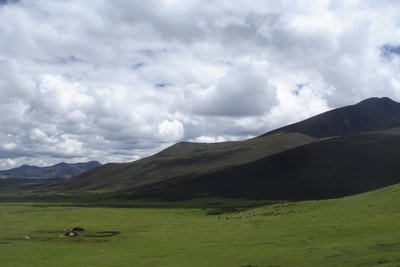 I found myself climbing over a 5000 meter pass the other day, and going down the otherside wasn't what I expected. It was rolling rolling rolling all day long, and has been for the last four days riding. I guess I've made it onto the Tibetan Plateau, though I can't be certain. It's all pasture land and peaks as far as the eye can see.
I found myself climbing over a 5000 meter pass the other day, and going down the otherside wasn't what I expected. It was rolling rolling rolling all day long, and has been for the last four days riding. I guess I've made it onto the Tibetan Plateau, though I can't be certain. It's all pasture land and peaks as far as the eye can see.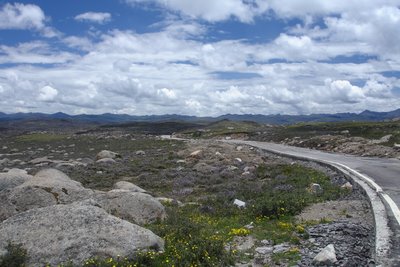 The piece of geography above lasted for half a day. I spent a lot of time lying off the side of the road watching that sky.
The piece of geography above lasted for half a day. I spent a lot of time lying off the side of the road watching that sky. Looked a bit like this from that perspective.
Looked a bit like this from that perspective.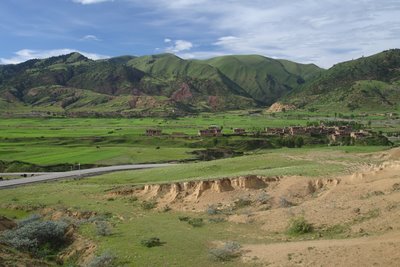 I did come down to around 4000 meters once and found myself in some southern Albertan coulees, except these ones were green. Almost made me want to go home. As they say, the grass is always greener on the... oh.
I did come down to around 4000 meters once and found myself in some southern Albertan coulees, except these ones were green. Almost made me want to go home. As they say, the grass is always greener on the... oh.
June 30th, 2006. Herdin'
 Once we found the trail leading the the lakes and stashed our bikes in the forest, it was pretty easy going. The trail was over a meter wide, and followed a river up into the mountains from the main road for about 25 km. We later learned that the trail had been a branch of the Cha Ma Gu Dao or "The Tea Horse Trail", the famed ancient trading route that runs from China into Tibet and Myanmar.
Once we found the trail leading the the lakes and stashed our bikes in the forest, it was pretty easy going. The trail was over a meter wide, and followed a river up into the mountains from the main road for about 25 km. We later learned that the trail had been a branch of the Cha Ma Gu Dao or "The Tea Horse Trail", the famed ancient trading route that runs from China into Tibet and Myanmar.
On the second day we neared the lakes and found grasslands full of yaks and Tibetan herders. Most were from the small villages down below along the road, and said that they spent about four months grazing animals before heading down. These kids where spending the summer with Grandma. I swear that the little girl looks a little Irish.
 We were making our way up to the lakes that evening when I took this picture.
We were making our way up to the lakes that evening when I took this picture.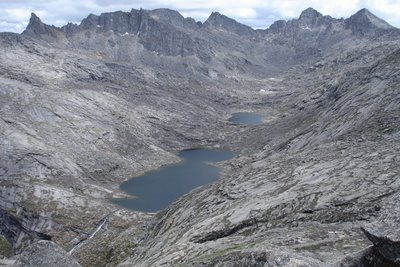 The next day we went to summit a mountain overlooking the lakes in the hopes of getting a fine view and breaking 5000 meters. Though the peak turned out to be 4950 meters (over 16000 feet), the view of the lakes and surrounding valleys was spectacular. The air was thin, and so the trick was to breath heavily through your mouth as you climbed. Every 20 or 30 steps up the mountain required a little rest to catch your breath. It was cold, but well worth it.
The next day we went to summit a mountain overlooking the lakes in the hopes of getting a fine view and breaking 5000 meters. Though the peak turned out to be 4950 meters (over 16000 feet), the view of the lakes and surrounding valleys was spectacular. The air was thin, and so the trick was to breath heavily through your mouth as you climbed. Every 20 or 30 steps up the mountain required a little rest to catch your breath. It was cold, but well worth it.
These are the top two lakes in a chain of seven that run down the valley. There were two huge waterfalls connecting the lakes, one of which you can just see here. While heading back to camp later that afternoon we were caught in a thunder storm. By the time we got back to camp we were soaked and freezing cold, and so we decided to head to a nearby herder's house. They had suggested that we should sleep there the night before, and we finally took them up on it.
While heading back to camp later that afternoon we were caught in a thunder storm. By the time we got back to camp we were soaked and freezing cold, and so we decided to head to a nearby herder's house. They had suggested that we should sleep there the night before, and we finally took them up on it. We warmed up quickly around their fire, and eventually feasted on momos (Tibetan steamed bread), hot butter tea, boiled yak's milk, yak cheese, yak yoghurt, and bai jiu. I like Yaks.
We warmed up quickly around their fire, and eventually feasted on momos (Tibetan steamed bread), hot butter tea, boiled yak's milk, yak cheese, yak yoghurt, and bai jiu. I like Yaks. They were up at the crack of dawn to milk the yaks. Everything was fogged in and the air was biting.
They were up at the crack of dawn to milk the yaks. Everything was fogged in and the air was biting. A little while later the sun crested the peaks and began to burn off the fog. By this time the four had milked over one hundred yaks and were prepared to start churning the milk.
A little while later the sun crested the peaks and began to burn off the fog. By this time the four had milked over one hundred yaks and were prepared to start churning the milk. We left their shelter a while later, full after a breakfast of butter tea and tsampa - a delicious mixture of barley flour and sugar moistened with butter tea. We bought some cheese that I've been eating on the road during the past few days. Perfect to stuff in the local pan bread with some of the chives I've been finding on the high platues.
We left their shelter a while later, full after a breakfast of butter tea and tsampa - a delicious mixture of barley flour and sugar moistened with butter tea. We bought some cheese that I've been eating on the road during the past few days. Perfect to stuff in the local pan bread with some of the chives I've been finding on the high platues.
June 21th, 2006. up and over to SiChuan
I haven't got a map of SiChuan province yet, and so I'm having a little difficulty in orienting myself to the roads, nature reserves, and passes in the area. Fortunately Brett has his trusty GPS, which he frequently consults. Although the maps it contains never note Chinese towns and rarely have the roads we travel on, it can report our altitude with astonishing accuracy.
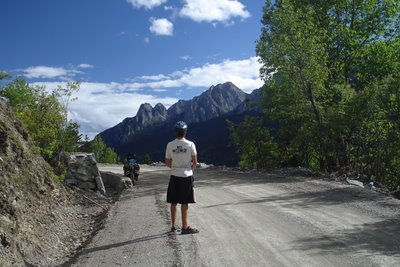 A view of the peaks while climbing the first pass.
A view of the peaks while climbing the first pass.
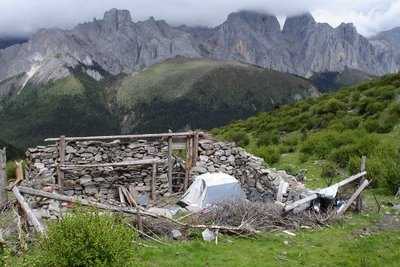 We found great campsites next to running water each night, and kept strong and healthy eating a strict diet of noodles and cookies. The last night we spent on top of "Big Snow Mountain Pass". We had considered camping up high, but in the end we didn't really have much choice. After climbing for most of the afternoon, we summited about an hour before sunset. It was crazy windy and really cold. Luckily we found an old abandoned herder's shelter just below the pass that we stayed in. It's stone walls provided the perfect windbreak, and we managed to start a fire and have tea and more noodles. Nice.
We found great campsites next to running water each night, and kept strong and healthy eating a strict diet of noodles and cookies. The last night we spent on top of "Big Snow Mountain Pass". We had considered camping up high, but in the end we didn't really have much choice. After climbing for most of the afternoon, we summited about an hour before sunset. It was crazy windy and really cold. Luckily we found an old abandoned herder's shelter just below the pass that we stayed in. It's stone walls provided the perfect windbreak, and we managed to start a fire and have tea and more noodles. Nice.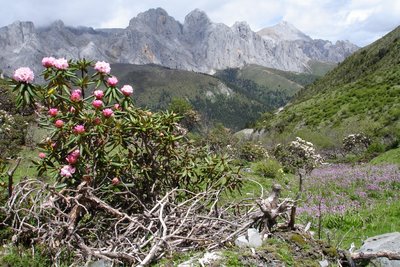 The alpine Himalaya burst into bloom over the past week. Blue and purple and yellow and white and red flowers cover the sides of most mountains. Some of the flowers are similar to those found in the Rockies, while others are unlike any I have ever seen. In this meadow we also saw many different birds and some pikas. I think that's what they were anyway... like a gopher crossed with a rabbit, only smaller.
The alpine Himalaya burst into bloom over the past week. Blue and purple and yellow and white and red flowers cover the sides of most mountains. Some of the flowers are similar to those found in the Rockies, while others are unlike any I have ever seen. In this meadow we also saw many different birds and some pikas. I think that's what they were anyway... like a gopher crossed with a rabbit, only smaller.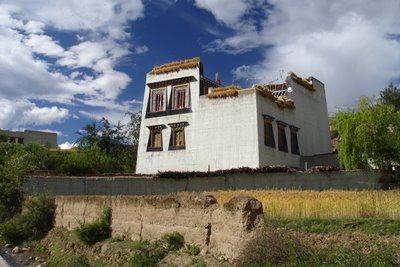 Upon descending from the pass, we rode through a valley unlike the others. This one is steep and dry. The Barley has recently ripened, and the farmers are harvesting and threshing the crop by hand (you can see the man on the roof there is threshing hard). The Tibetan houses here are much different than those in YunNan, though still very imposing.
Upon descending from the pass, we rode through a valley unlike the others. This one is steep and dry. The Barley has recently ripened, and the farmers are harvesting and threshing the crop by hand (you can see the man on the roof there is threshing hard). The Tibetan houses here are much different than those in YunNan, though still very imposing.
We met a group of backpackers upon arriving in town, and they directed us to an amazing guesthouse in one of these traditional Tibetan homes. The interior is all wood and very dark, vaulted ceilings and huge beams, with every wall covered in depictions of stories from Tibetan Buddhism painted in primary colours.
The owners don't speak English, and so Brett and I find ourselves serving as interpreters for both groups. "Can I have some sugar for my tea?" "You need to pay your bill now." "What time do you close the gates?" "How do we get to BaMu lake?" and so on ad infinitum. Maybe I will stay here for awhile and help manage the place!
June 13th, 2006. Long time coming
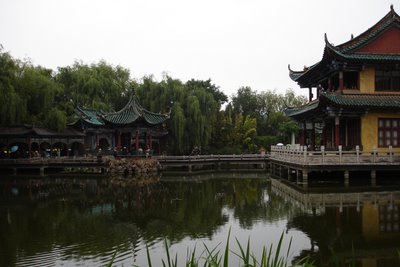 City's tend to temporarily suck the life out of me if I'm not careful, and getting a bit sick in Kunming didn't help much. But that's all over now! Mountains have the opposite effect on me.
City's tend to temporarily suck the life out of me if I'm not careful, and getting a bit sick in Kunming didn't help much. But that's all over now! Mountains have the opposite effect on me.
Since KunMing, we have spent time the backpacker center of DaLi, the Chinese tourist Mecca LiJiang, Tiger Leaping Gorge, and a backroad over a 3800 meter pass to get here.
Now we are in ZhongDian, a.k.a. Xiang Ge Li La, a.k.a. Shangri-La. Shangri-La is a bit of a stretch - a ploy to bring in tourists no doubt - but it's a beautiful area none the less. On the edge of the Tibetan plateau, this has apparently been a centre where Tibetans met with YunNanese and others to trade for the last thousand years.
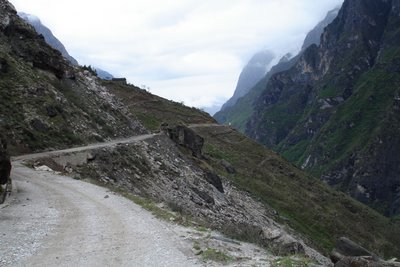 I don't really have anything good to say about DaLi and LiJiang, so I won't. Onto Tiger Leaping Gorge. Located about ten kilometers after the "first bend" of the Yangtze River (where the Yangtze essentially turns back on it's self, therefore flowing out into central China rather than Southeast Asia - you understand the significance), the gorge is flanked by 4000 meter peaks on both sides, while the Yangtze flows at 1900 meters. It's big. It's so big that it was really difficult to take a decent picture of it. You had to be there.
I don't really have anything good to say about DaLi and LiJiang, so I won't. Onto Tiger Leaping Gorge. Located about ten kilometers after the "first bend" of the Yangtze River (where the Yangtze essentially turns back on it's self, therefore flowing out into central China rather than Southeast Asia - you understand the significance), the gorge is flanked by 4000 meter peaks on both sides, while the Yangtze flows at 1900 meters. It's big. It's so big that it was really difficult to take a decent picture of it. You had to be there.
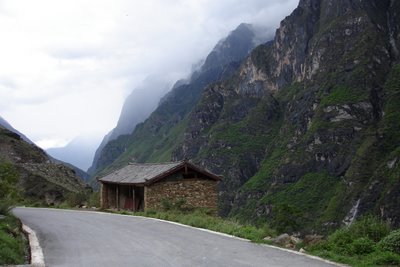 Roadside house.
Roadside house. There's even farming in a few more open spots along the gorge.
There's even farming in a few more open spots along the gorge.
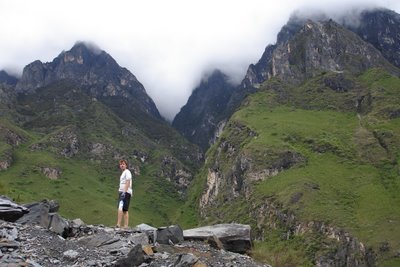 We waited here for a couple of hours after we came upon a little landslide that injured three road workers. It seems that while they were clearing the rocks from an earlier landslide, more rocks came down and broke a few arms. It was a little scary for a while, as those with the "authoritah" were panicking. Eventually a van was commandeered to shuttle these boys to the hospital. After the authoritah left, some locals took to clearing the rocks that blocked the road themselves. They would sprint into the red zone, grab or push a rock of the edge and sprint out. Then another guy would take his turn. I can attest that at least two more fair sized rocks fell during this operation. After it was suitably clear, a truck approached the slide area and everyone but the driver got out. They ran across one by one, and finally the truck sped through. About twenty vehicles proceeded in this manner. It had been about an hour since the last rocks had fallen, so last of all Brett and I also made our way through. hmmm maybe I shouldn't tell this story.
We waited here for a couple of hours after we came upon a little landslide that injured three road workers. It seems that while they were clearing the rocks from an earlier landslide, more rocks came down and broke a few arms. It was a little scary for a while, as those with the "authoritah" were panicking. Eventually a van was commandeered to shuttle these boys to the hospital. After the authoritah left, some locals took to clearing the rocks that blocked the road themselves. They would sprint into the red zone, grab or push a rock of the edge and sprint out. Then another guy would take his turn. I can attest that at least two more fair sized rocks fell during this operation. After it was suitably clear, a truck approached the slide area and everyone but the driver got out. They ran across one by one, and finally the truck sped through. About twenty vehicles proceeded in this manner. It had been about an hour since the last rocks had fallen, so last of all Brett and I also made our way through. hmmm maybe I shouldn't tell this story.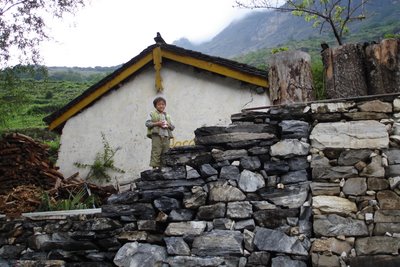 We stayed at a nice guest house in the gorge for the night. There, this little girl taught me the correct way to beckon "BaoZi" the dog. She also laughed to herself every time she saw me walking (I developed a limp, not from bicycling, but after walking my knee into a fire hydrant placed in the middle of the sidewalk in LiJiang).
We stayed at a nice guest house in the gorge for the night. There, this little girl taught me the correct way to beckon "BaoZi" the dog. She also laughed to herself every time she saw me walking (I developed a limp, not from bicycling, but after walking my knee into a fire hydrant placed in the middle of the sidewalk in LiJiang).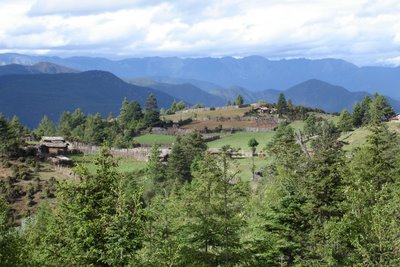
The little farmstead above was around 3400 meters. They raise pigs, horses and a few cattle, and farm wheat and vegetables.
After the gorge, we continued on a backroad towards ZhongDian and eventually over a huge pass. We must have done about 1700 meters of climbing over two days. It was slow going, but the views were great. There were four distinct valleys, scenically and culturally. In one valley an older women dressed in full traditional wear stuck her tongue out at me (this is a greeting I understand?). I stuck my tongue out at her in return and she laughed.
One valley I have named "Friendly Valley" and the next I named "Crazy Valley". In "Crazy Valley" I was accosted by a marauding group of ten year olds. They grabbed onto my panniers and stopped me dead in my tracks. They demanded chocolate. They attempted to open my bags, and then tried to take them off my bike. I humored them for a while and then said my farewell. They immediately gave chase and managed to stop me again. In the end I had to employ a technique that I use on mountain dogs. I pretended that I was going to kick them with one foot as I rode away. It worked.
A man also hissed at Brett in Crazy Valley.
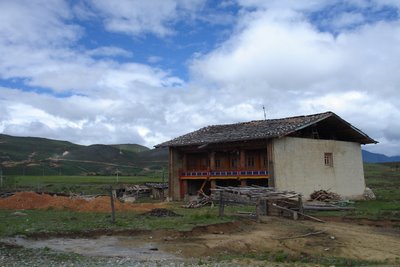 We came over the pass and dropped down a few hundred meters, but everything was different. The houses, the people, the livestock. Yaks everywhere. Monstrous houses. I guess this was the cultural border of Tibet. 30 km later we arrived here in ZhongDian...
We came over the pass and dropped down a few hundred meters, but everything was different. The houses, the people, the livestock. Yaks everywhere. Monstrous houses. I guess this was the cultural border of Tibet. 30 km later we arrived here in ZhongDian...
June 1st, 2006 More Kunming
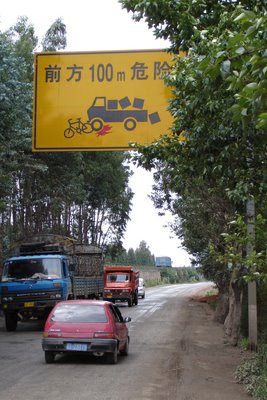 This road was as dangerous as it looks.
This road was as dangerous as it looks.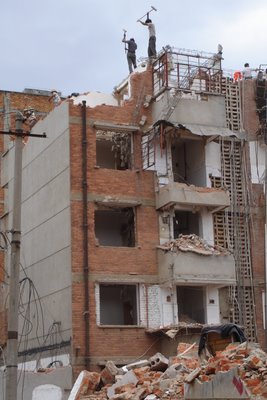 Taking down old buildings the quick and easy way. I'd like to point out that these guys are hammering on the very brick walls that they are standing on.
Taking down old buildings the quick and easy way. I'd like to point out that these guys are hammering on the very brick walls that they are standing on.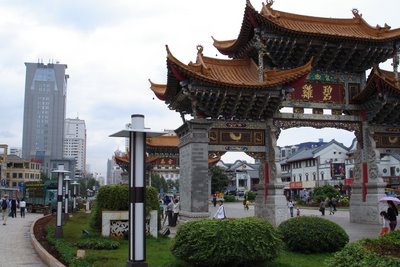 Downtown Kunming.
Downtown Kunming. More of downtown. Kunming is way out in the boonies, far from ShenZhen and the factories that produce most of the goods in the world. And yet, the economy is booming and the city is in some ways more developed and progressive than most North American cities. In addition to dedicated bus and bicycle lanes, wide sidewalks, solar heated water, and plenty of public green space, almost all of the scooters are electric. All this in a city of 5 million people that succeeds in feeling like a city of about 500,000.
More of downtown. Kunming is way out in the boonies, far from ShenZhen and the factories that produce most of the goods in the world. And yet, the economy is booming and the city is in some ways more developed and progressive than most North American cities. In addition to dedicated bus and bicycle lanes, wide sidewalks, solar heated water, and plenty of public green space, almost all of the scooters are electric. All this in a city of 5 million people that succeeds in feeling like a city of about 500,000.Today we are off to DaLi and the Himalaya. Better pictures are sure to follow.
May 28th, 2006. The Spring City
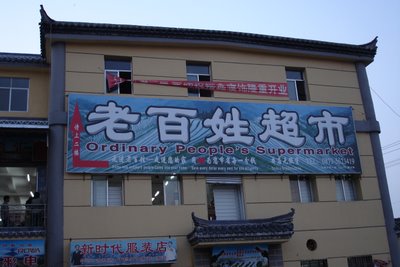
Oh
For some reason, I have a strong urge to participate in the economy. That's right kids, I'm really considering buying something not directly related to my daily survival. Something like.... well, something anyway. I haven't pinpointed it any further than that initial feeling.
Go Consumerism! You truly work in mysterious ways.
On a related note, some of you may have heard about the upcoming IPO of the Bank of China. I heard that they are set to raise over $11 Billion US from investors. As someone who recently visited a branch of this fine organization, I feel more than qualified to confirm for you that the Bank of China is, in fact, a bank. This isn't a communist plot folks. Indeed, I was successful in withdrawing my weekly living expenses, $50 US, in RenMinBi (almost 400 Yuan) earlier today. They had no problem in providing me with this amount of hard currency on the spot. Even more amazing was the 35 cent commission I was charged for the transaction.
I implore all the brave free market capitalists out there with liquid assets to take this opportunity by the horns. With your billions, our Bank of China can model itself on the fine banks in
Providing returns for investors.
Yes sir, if I was a man of means, the first thing I would do was demand that the Bank of China raise the commission for changing traveler’s cheques to at least $1. I've also noticed that the Chinese are not buying on credit as much as they should be. We need to change that. We should also spring inflated ATM fees on these fools.
Ahem.
Following are a hodgepodge of photos totally unrelated to
May 20th, 2006. it's like this
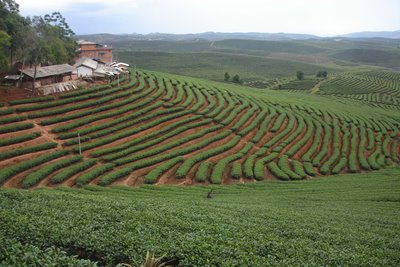 Just ONE more picture of tea, ok? DaDuGuan grows a lot of tea... this view well made up for rough day of climbing.
Just ONE more picture of tea, ok? DaDuGuan grows a lot of tea... this view well made up for rough day of climbing.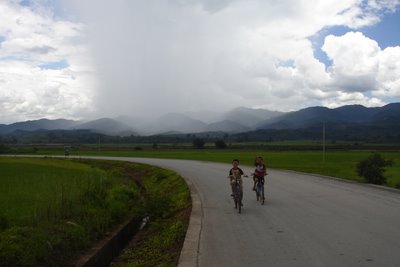 This storm had us spend about half an hour under a nervous woman's shop awning. She didn't know what to make of us. After the third cookie purchase though, the ice was broken. Score one more for successful cultural exchanges!
This storm had us spend about half an hour under a nervous woman's shop awning. She didn't know what to make of us. After the third cookie purchase though, the ice was broken. Score one more for successful cultural exchanges!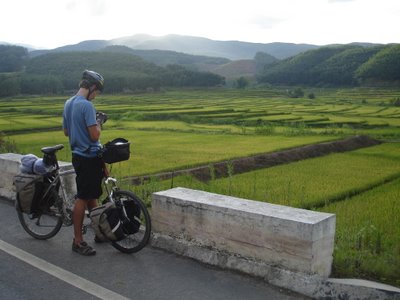 Pictures... pictures of people taking pictures... are the most wonderful pictures in the world.
Pictures... pictures of people taking pictures... are the most wonderful pictures in the world.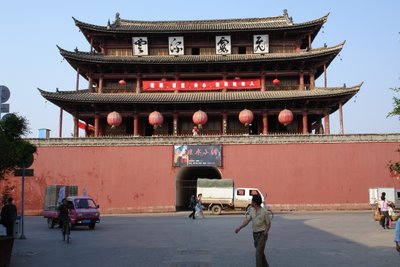 Definitive proof that I am in China. This is DongMen (the eastern gate) in JianShui. Even the locals are impressed. The apprentice of the designer of this gate is said to have designed and built TainAnMen in BeiJing 20 years after DongMen was built. As not to surpass this teacher, TianAnMen is one floor shorter. Take that BeiJing!
Definitive proof that I am in China. This is DongMen (the eastern gate) in JianShui. Even the locals are impressed. The apprentice of the designer of this gate is said to have designed and built TainAnMen in BeiJing 20 years after DongMen was built. As not to surpass this teacher, TianAnMen is one floor shorter. Take that BeiJing!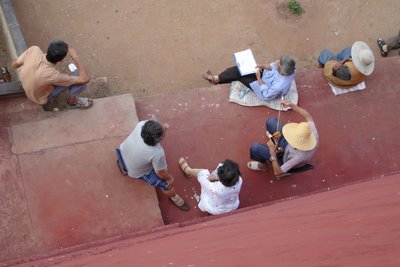 Looking down from the gate. Local folks relaxing over the sweet sounds of the ErHu.
Looking down from the gate. Local folks relaxing over the sweet sounds of the ErHu.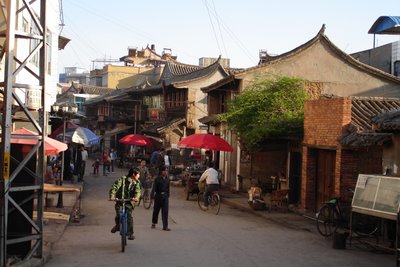 Backroads in ShiPing. All of these southern cities still have raucous old districts full of markets and mayhem.
Backroads in ShiPing. All of these southern cities still have raucous old districts full of markets and mayhem.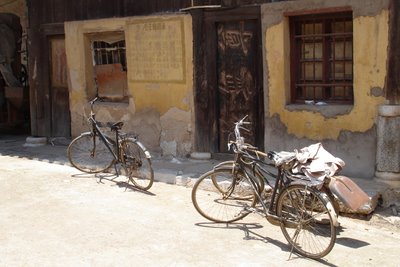 Local cruisers. Cushy. No wonder the old men aren't jealous of our rides.
Local cruisers. Cushy. No wonder the old men aren't jealous of our rides.
May 18th, 2006. Pu'er Pilgrimage
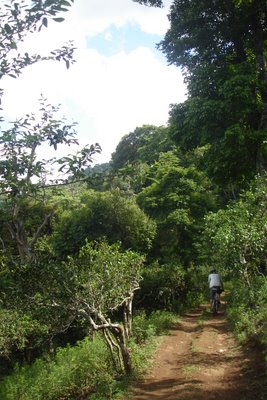 We did not set off early the next morning. Those lacking experience be warned: a pu'er hangover can be tough to deal with. It's is best cured with a lot of water and another strong cup of tea.
We did not set off early the next morning. Those lacking experience be warned: a pu'er hangover can be tough to deal with. It's is best cured with a lot of water and another strong cup of tea.
After climbing to an elevation of around 1700 meters on a rough road, getting lost in an old village, avoiding a local guide, and finally getting more much needed directions, we finally got onto some nice dirt tracks that lead into the fields. That's a stunted tea tree on the left side of the road.
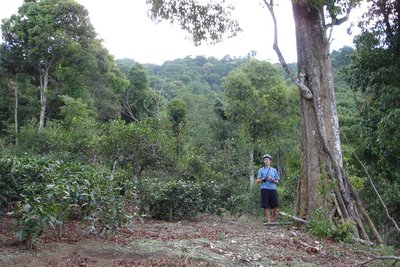 A look back at the hills and some smaller tea trees on the left.
A look back at the hills and some smaller tea trees on the left.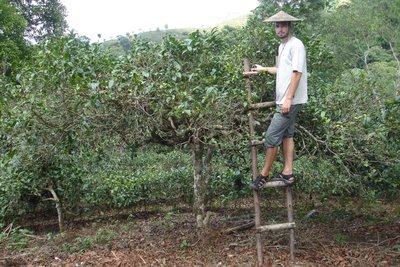 This is one of the oldest tea farmers in the area. Note the look of concentration as he busily tends to his trees.
This is one of the oldest tea farmers in the area. Note the look of concentration as he busily tends to his trees.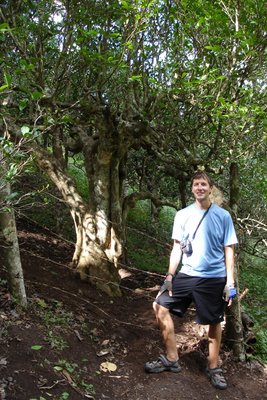 This tree is said to be 700 or 800 years old.
This tree is said to be 700 or 800 years old.
As I understand it, tea actually originated in this area. Probably not in this field or anything, but this county has apparently been producing tea for thousands of years.
We bought some "big tree tea" in town that we occasionally mix in with the morning pot of Pu'er.
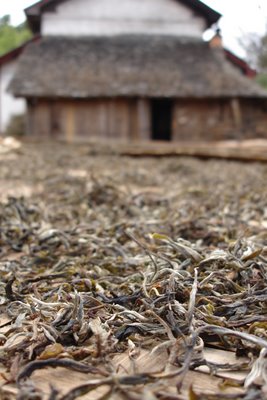 Tea in the initial stages of fermentation.
Tea in the initial stages of fermentation. That's about all I've got concerning tea.
Now we are in JianShui, a city with a great old section of town. Tonight we are heading to a local tea house we scoped out last night for some song and dance, and probably some gong fu, all of course over tea.
I like tea.



